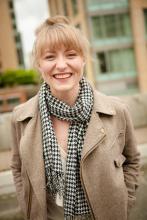Marya Sea Kaminski is a writer, actor, and solo performer, and, as of September 2014, the Associate Artistic Director of Seattle Repertory Theatre. She is a founding member of and was co-artistic director of the Washington Ensemble Theatre from 2004-2008. Her work has earned her many awards including the 2010 Genius Award in Theater from The Stranger. Marya earned her MFA (Professional Actor Training Program) from UW Drama in 2004. She recently took the time to answer a few questions over email about her new role at Seattle Rep.
In August, you wrote about your desire to return to artistic leadership. How do you define/approach artistic leadership?
For me, leadership is about standing up for the community I belong to, making sure everyone is counted and that we are collectively nourished with the things we need. In the case of artists, I believe our nourishment comes from opportunity, variety, challenge, and collaboration. I don't think leadership is about forging forward and hoping people follow in the momentum of big decisions, though sometimes that might happen. I think it's primarily about serving, your people and your craft. Of course, there is a vast distance between describing this kind of leadership and then actually following through on these mandates, but I think part of my job right now is to aspire. I want to consider the great theatrical leaders and thinkers of our time—Harold Clurman, Joe Papp, Anne Bogart, Hallie Flanagan, and (a most recent discovery) Percy McKay—and how they took the risk to think deeply not only about their work but how their work serves their community. And then I think of the great leaders who have shaped my experience as an artist in this city like Jerry Manning, Braden Abraham, Robin Lynn Smith, Richard ET White, Jon Jory, Linda Hartzell, Val Curtis-Newton, Jen Zeyl, Andrew Russell, Randy Engstrom...the list goes on. Those are the people who define artistic leadership in my life. They're the ones I want to follow.
I don't think leadership is about forging forward and hoping people follow in the momentum of big decisions, though sometimes that might happen. I think it's primarily about serving, your people and your craft.
How did your work—administrative and artistic—for WET prepare you for your new role at Seattle Rep? And what are the differences—surprising, welcome, and challenging?
My years as a co-artistic director of the Washington Ensemble Theatre were not only the most joyful, but were also the most rigorous and educational time of my artistic life. That work was a terrific introduction to the opportunities and responsibilities I have now at the Rep. Of course, Seattle Rep is a much bigger machine than WET will probably ever be and that increase in scale has been a shock and a thrill to my system. While I am still in the process of learning the history, practices and idiosyncrasies of working in an organization of this size, the scope of what we can do in terms of projects, audience and impact seems limitless to me right now.
What about your trajectory as an artist has surprised you the most?
That I've still got ‘em all fooled.
How did the program at UW challenge you to grow as an artist, student, and teacher?
UW is the place I really learned that I didn't have to be a "successful regional theatre actor" to be a real theatre artist. It took me a long and painful time to learn that I didn't need to be an ingénue obsessed with Shakespeare to be able to make a significant contribution to this field. At UW, I was encouraged to write and develop solo work, devise original plays with an ensemble and, yes, to venture into producing and artistic leadership. Of course, the acting training was excellent and redefined the way I thought about performance and process. But I never wanted to just be an actor. I would be terrible at that. Bored and boring. UW was the perfect place for me to become a better artist by blowing on the embers of all these other passions as well. And, honestly, Seattle has been the perfect playground for me to grow, experiment, fail and try again to lead the most rewarding artistic life I can.
I never wanted to just be an actor. I would be terrible at that. Bored and boring. UW was the perfect place for me to become a better artist by blowing on the embers of all these other passions as well.
What are you looking forward to most in your position as Associate Artistic Director at Seattle Rep?
I'm looking forward to sitting in the back of the theater when the entire building is quiet and dark and thinking of Jerry Manning, and of all the great work I've seen on those stages, and of all the crazy opportunities I've had in those rehearsal rooms. I plan to make a practice of feeling that deep gratitude and then dreaming how I can give those gifts away to the next crop of rowdy talents who are bursting at the seams and waiting for someone to notice.

